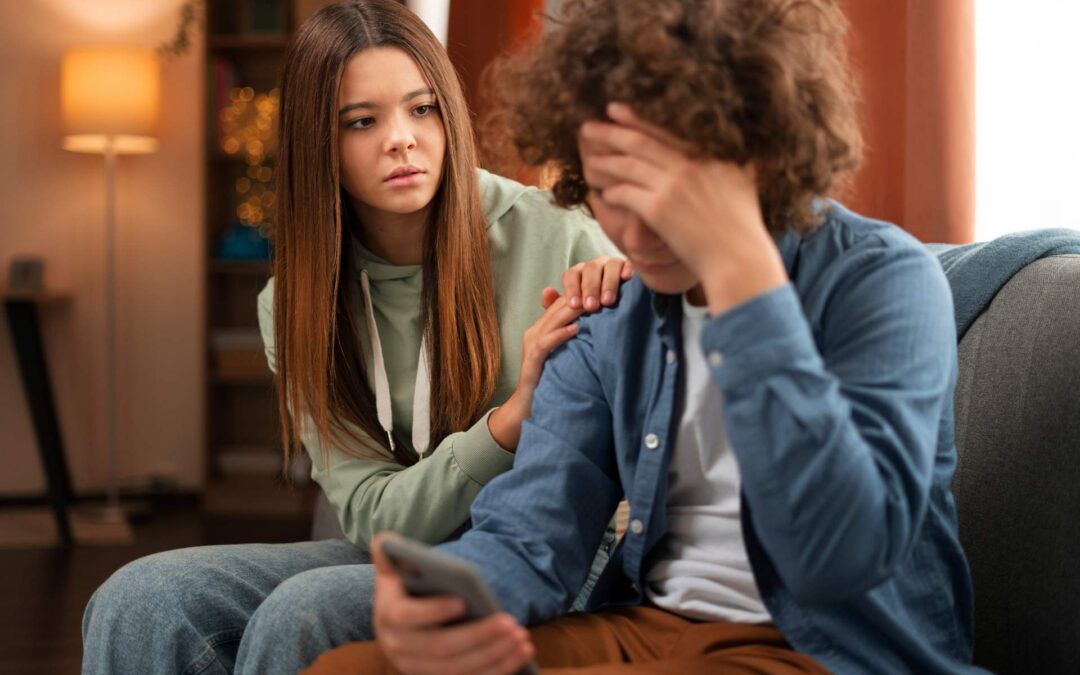Anxiety has a way of creeping into every corner of our lives, and for many of us, it has an especially strong impact on our relationships. I’ve been there—I know firsthand how anxiety can leave us feeling disconnected, misunderstood, and alone, even when we’re surrounded by people we love. If you’re here, you’re probably feeling the strain too. Maybe you’re starting to notice how your own anxiety is making it harder to communicate or stay present with your partner, family, or friends. You’re not alone, and the good news is there’s hope. Therapy can make a world of difference.
So, how exactly does anxiety affect our relationships, and how can therapy help bridge those gaps? Let’s dive in.
Understanding the Impact of Anxiety on Relationships
Anxiety is more than just feeling worried from time to time. It can be an intense, almost constant worry that pulls us out of the present moment and makes it hard to focus on anything but our fears. I remember feeling as though my mind was like a loud room, full of “what ifs” and scenarios that may never even happen. When I was with my partner or friends, my attention was constantly divided—I was physically there, but my mind was a hundred miles away.
Over time, this disconnect can lead to misunderstandings and frustrations on both sides. Anxiety can look like pulling away, overthinking everything said (or left unsaid), or even becoming overly dependent on someone for reassurance. It’s common to feel trapped in a cycle of worry and guilt: you’re anxious about something, then feel guilty for not being fully present, which fuels even more anxiety. This cycle can lead to tension and emotional distance.
How Therapy Can Help Reconnect You with Yourself—and Others
Therapy has a way of gently unraveling these complex layers. Whether it’s individual therapy or couples therapy, working with a therapist can help you understand where your anxiety comes from, how it operates, and—most importantly—how to manage it.
Building Awareness and Acceptance
Therapy can help us recognize the subtle ways that anxiety shows up in our relationships. For instance, you might start noticing patterns, like how you tend to withdraw emotionally during times of stress, or how certain conversations seem to trigger your worries. Personally, I found that acknowledging my anxiety and becoming more aware of its effects was the first step in reclaiming my peace.
A therapist can guide you to see these patterns without judgment, helping you accept that these feelings don’t define you. In my experience, just knowing that anxiety doesn’t make me “too needy” or “too distant”—and that it’s just part of being human—was freeing.
Improving Communication
One of the most powerful ways therapy supports relationships is by helping you communicate more openly. Anxiety can make it hard to express our needs; we often assume we’re “too much” or that our fears are irrational. In therapy, you learn how to share these feelings without shame.
This is especially beneficial in couples therapy for anxiety. Imagine being able to tell your partner, “I’m feeling overwhelmed, and it would help if you could just sit with me,” instead of bottling it up or reacting in frustration. Therapy provides you with the tools to express your needs in a way that invites your partner to support you, rather than pushing them away.
Learning Coping Strategies for the Long Haul
Managing anxiety takes work, and therapy can give you practical strategies to help you feel grounded when the worries start to spiral. Personally, I learned techniques like grounding exercises, mindfulness, and breathing exercises that I now rely on whenever my anxiety threatens to overwhelm me.
A therapist can help you tailor these strategies to your specific needs and lifestyle, so you can find what works best for you. Over time, you’ll start to feel more in control of your anxiety, which means you’ll have more energy to devote to the people you care about.
Rebuilding Self-Esteem and Self-Worth
Anxiety often comes hand in hand with low self-esteem, which can make it hard to believe we deserve to be loved or understood. Therapy helps us challenge these thoughts and beliefs, reminding us that we’re more than our anxious moments.
Through therapy, I learned to see myself with compassion, instead of judging myself for feeling anxious. This shift in perspective transformed my relationships. I stopped expecting my partner or friends to “fix” my anxiety and instead allowed them to be part of my journey. Building self-worth doesn’t happen overnight, but each therapy session can help you move a little closer.
Deepening Emotional Intimacy
Therapy can open doors to deeper emotional intimacy with others by helping you understand and accept yourself better. Anxiety can make us question whether we’re worth connecting with on a deeper level, but therapy can help us work through these doubts and fears. It took time, but I found that as I started to share more about my journey with anxiety in a safe, therapeutic space, I felt more comfortable being open with my loved ones too.
When Should You Consider Couples Therapy for Anxiety?
Sometimes, anxiety affects not only the individual but also the dynamics within the relationship. If your partner is open to it, couples therapy can be incredibly helpful for understanding each other’s perspectives and working together to manage the effects of anxiety on your relationship. In couples therapy, both partners learn how to create a safe space for anxiety to be discussed openly, without judgment.
Couples therapy doesn’t mean that you’re “failing” or that your relationship is broken; rather, it’s a proactive step to strengthen your connection. By learning to support each other in a healthy way, couples therapy can make your relationship a source of strength rather than stress.
Takeaway: You’re Not Alone, and Therapy Can Help
Anxiety doesn’t have to control your relationships. Therapy can help you break free from the patterns that keep you feeling isolated and disconnected. Imagine a life where you can be fully present with the people you love, where you feel safe expressing your needs, and where you can manage your anxiety with compassion. It’s possible—and it’s worth every bit of effort.
So if you’re feeling like anxiety is pulling you away from the people you care about, consider reaching out to a therapist. Whether you choose individual therapy or couples therapy for anxiety, taking that first step is a courageous move toward a life filled with connection, understanding, and love.

